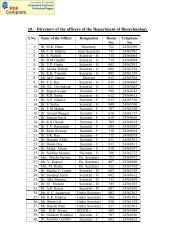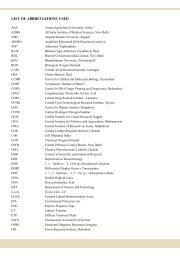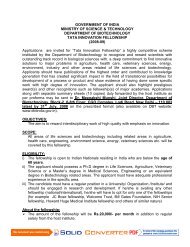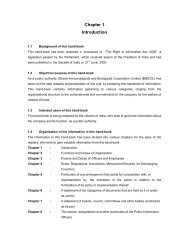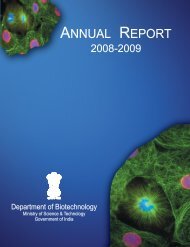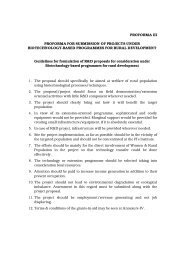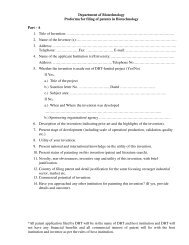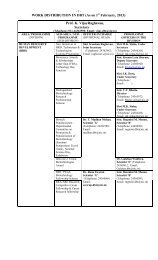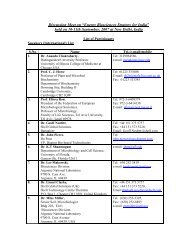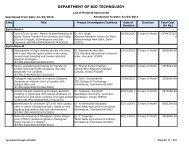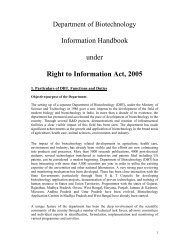ANNUAL REPORT - Department of Biotechnology
ANNUAL REPORT - Department of Biotechnology
ANNUAL REPORT - Department of Biotechnology
Create successful ePaper yourself
Turn your PDF publications into a flip-book with our unique Google optimized e-Paper software.
Atlanta and IISc., Bangalore-Stanford University,<br />
USA, phase-I clinical trials <strong>of</strong> the rotaviral diarrhoea<br />
vaccine strains (116E & I321) for the safety and<br />
immunogencity studies have been completed in<br />
India and USA using the vaccine produced in AGMK<br />
cell lines in adults, older children and infants,<br />
suggesting that the vaccine is safe. Vaccine take was<br />
reported in 74% <strong>of</strong> recipients <strong>of</strong> 116E vaccine<br />
candidate and 40% recipients <strong>of</strong> I321 vaccine. M/s.<br />
Bharat Biotech International Ltd. (BBIL), Hyderabad<br />
has produced prototype vero cell based vaccine<br />
(116E), under cGMP conditions and initiated Double-<br />
Blind Randomized Placebo Controlled Dose<br />
Escalating Phase Ib/IIa study in December, 2006 to<br />
evaluate the safety and immunogenicity <strong>of</strong> live<br />
attenuated rotavirus vaccine 116E in healthy non<br />
malnourished infants 8-20 weeks <strong>of</strong> age. As an initial<br />
step, infants were screened for eligibility (healthy,<br />
non-malnourished) for receiving the vaccine.<br />
Subsequently rotaviral diarrhoea vaccine was<br />
administered to eligible infants.<br />
Malaria<br />
Under the project implemented at ICGEB and<br />
NMRC, New Delhi, expression <strong>of</strong> recombinant<br />
PvRII (one <strong>of</strong> the P.vivax duffy binding protein)<br />
encoding for 38 kD product has been studied. Pilot<br />
scale (10L fermentation scale) methods to produce<br />
correctly folded recombinant PvRII have been<br />
developed with final yield <strong>of</strong> ~200 mg PvRII per L<br />
fermentation culture and produced at pilot scale and<br />
formulated with Montanide ISA 720, AS02A, QS21,<br />
MF59 and alum has been used for immunogenicity<br />
studies in mice. Formulations with Montanide ISA<br />
720 and AS02A are highly immunogenic in mice and<br />
elicit high titer binding inhibitory antibodies. Methods<br />
for production <strong>of</strong> PvRII have been scaled up to 50L<br />
fermentation scale and 100L refolding scale at the<br />
Bharat Biotech International Ltd. under cGMP<br />
conditions. Further stability studies have been<br />
performed with two batches <strong>of</strong> recombinant PvRII<br />
produced at 50L scale at two temperatures.<br />
Lyophilization condition for recombinant PvRII has<br />
been developed. Formulation <strong>of</strong> recombinant PvRII<br />
with AS02A has been tested for stability where PvRII<br />
was found to be stable in the emulsion. The scale up<br />
studies and recombinant PvRII have been carried<br />
out at BBIL, Hyderabad, including establishment <strong>of</strong><br />
downstream processes and various quality control<br />
DBT Annual Report 2006-07<br />
170<br />
parameters etc. Toxicology studies have been<br />
completed and planned to start phase-I clinical trial<br />
are being initiated in humans.<br />
Hepatitis-C<br />
The joint project implemented at Deccan College <strong>of</strong><br />
Medical Sciences & Allied Hospitals, Hyderabad and<br />
University <strong>of</strong> Tennessee Health Sciences Center,<br />
Memphis, USA, on molecular epidemiology <strong>of</strong><br />
genetic variation in the Hyper Variable Region-I<br />
(HVR-I) sequence <strong>of</strong> Indian patients and response to<br />
interferon, therapy, 300 HCV infected samples for<br />
genotyping in north and south India (Hyderabad,<br />
New Delhi, Lucknow) have been studied. Cloning<br />
and sequencing <strong>of</strong> the complete genome <strong>of</strong> HCV<br />
strain isolated from a single patient was carried out.<br />
The complete sequence was deposited in GenBank<br />
and can be retrieved using Accession No.:<br />
AY051292. Further comparative studies have been<br />
carried out with other known full-length sequences<br />
isolated from various geographical regions and it was<br />
observed that the Indian strains are closely related to<br />
Indonesian strains and there is high heterogeneity on<br />
gene sequences in envelope region.<br />
Further twenty two <strong>of</strong> the 59 samples analyzed for<br />
HVR region showed 100% homology to the<br />
AY051292 strain, while only 4 showed 100%<br />
similarity to the AY651061 strain. Under the present<br />
study only 17 <strong>of</strong> the enrolled 25 patients, samples<br />
showed response to the therapy. The study also<br />
shows that genotype 3 samples had a response rate<br />
<strong>of</strong> 77.7% when compared to genotype 1 samples that<br />
had a response rate <strong>of</strong> 62.5%.<br />
Tuberculosis<br />
The collaborative study on “High throughput<br />
PCR assays for diagnosing tuberculosis caused by<br />
Mycobacterium tuberculosis and Mycobacterium<br />
bovis using molecular beacons” at AIIMS, New Delhi,<br />
CJILMD, Agra and Public Health Research Institute,<br />
Newark, New Jersey supported with an objective to<br />
develop reliable devR- and hupB-based PCR assays<br />
in visual format using molecular beacons. The group<br />
has collected a total <strong>of</strong> 77 sputum specimens from<br />
LRSI <strong>of</strong> TB and Respiratory Diseases. The samples<br />
were processed for culture and devR PCR by the



